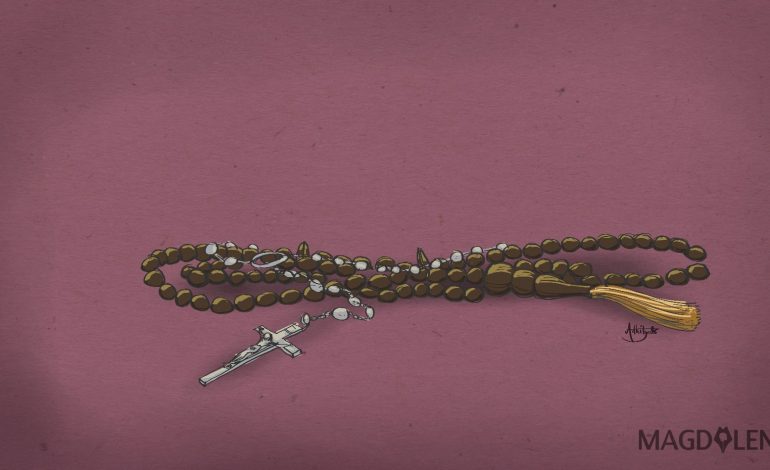New Doco Gives Voice to Voiceless Rape Victims

Numerous cases of sexual violence in Indonesia have not been fairly solved or brought to justice. Many victims have been either silenced by their abusers, or have chosen to stay silent to avoid embarrassment. A new documentary Memory and Hope (Masih Ada Asa) attempts to give a voice to these “voiceless” survivors of sexual violence.
As an initiative by Peace Women Across the Globe (PWAG) Indonesia, a volunteer network of women that focuses on knowledge management and education programs for young people, the film was screened at Galeri Indonesia Kaya at Grand Indonesia mall, Jakarta, on June 19. It is a haunting reminder of the countless survivors of sexual violence whose lives have been destroyed, whose futures were robbed, and who still struggle to seek justice.
“This is not only about hope, but also the courage to heal the wounds,” said film director Yudha Kurniawan.
The documentary follows the lives of Ati and Ros, two women from Maumere, Flores, who survived sexual violence when they were young. Ati is an elementary school teacher in Ngolo, Flores. When she was in senior high school, she was raped by her landlord, who now happens to be a member of the local legislature in Sikka, Maumere.
“I went home early from school one Friday afternoon, when Muslim men were performing the Friday prayers at the mosque,” begins her description of the ill-fated day in the film.
“When I was about to go to my room, my landlord grabbed my arm and pushed me inside his room. At first I thought he was just fooling around, but then he banged my head repeatedly against the door and threw my body to his bed. I screamed and cried, but no one seemed to hear me. I was still wearing my school uniform, a long skirt and all covered, so I could hardly move to resist him. When I ran out of energy to fight him, that was when he committed the crime,” she said.
Later, Ati got married to a man, but he eventually left and never returned, leaving her a widow and a single parent without a legal divorce. She struggles to be the main provider of her family (her father passed away a year ago), getting by with Rp 265,500 (about US$20) in monthly salary, which is hardly enough to provide a decent living for herself, her mother, her three youngest siblings and her son.
Like Ati, Ros has struggled nearly all her life. The 22-year-old works as a housemaid in Jakarta. When she was still in school, she was raped and abused by 11 schoolboys in a small alley. Some of the boys were drunk when they assaulted her. She decided to stay silent because she was too embarrassed to tell anybody about it, until she found out that she was pregnant four months later.
Eventually, both women were helped by TRUK-F, an independent organization for humanity that focuses on handling cases of violence against women and children in Flores. They accompanied the victims during trials to seek justice, which have been unsuccessful so far. Ati’s rapist remains untouchable by the law to this day, as he is now a legislative member. Even after numerous efforts, the case never made it to court . And although all of Ros’ attackers were sent to jail, they were out within three years.
The film producer Olin Monteiro said that it took her 13 years to conduct research on the documentary, and she faced a lot of difficulties in producing it. Among the hardest part was approaching the victims and getting them to tell their stories, she said.

“The reason we documented these stories is that we want people to know about this issue. We want you to be disturbed by the bitter reality that we face in our country,” Olin said.
TRUK-F has handled over 2,000 cases from 2000 to 2014, with an average of 120 cases per year. However, the number of unreported cases are much higher, with many involving incest or child-rape. According to the National Commission for the Protection of Women from Violence (Komnas Perempuan) in 2014 there were 293,220 reported cases of violence against women. Of these, 217 cases were perpetrated by legislative members.
In the discussion that followed, film critic Adrian Jonathan Pasaribu criticized the film’s perspective as being too narrow, because it only depicts the victim’s perspective.
“I believe we all know that there are countless sexual victims in Indonesia. These cases are not unique to Maumere, since it happens across the globe, so what makes it different in Maumere? Is there any socio-cultural factor that may contribute to the problems? What is the relations between men and women like there?” he asked.
He argued that as an advocacy film it should highlight the root of the problem to find a strategic solution to tackle it. He also criticized the fact that the film focused more on the economic problems faced by the women, and not so much on the socio-cultural aspects of their lives. But Vika, a member of the audience, expressed her appreciation for the movie, despite the “shortcomings”.
“I understand that it is not easy for the victims of sexual violence to share their traumatic experiences. I believe it’s one of the main purposes of making the film: to encourage other survivors across Indonesia to speak up.”
*Read Ayunda’s piece on interfaith marriage
To continue the conversation and support the campaign against sexual violence, visit campaign.com/mulaibicara.






















